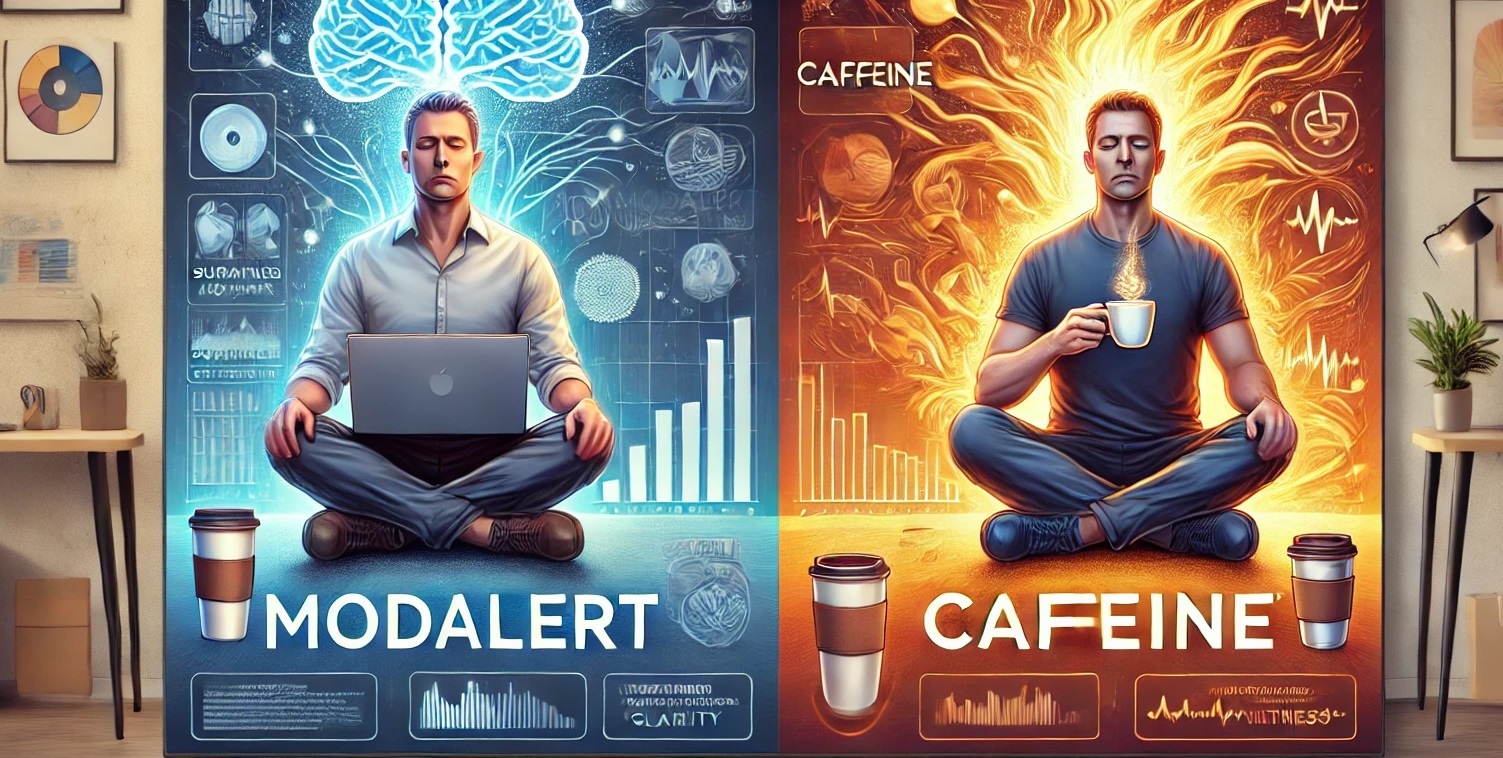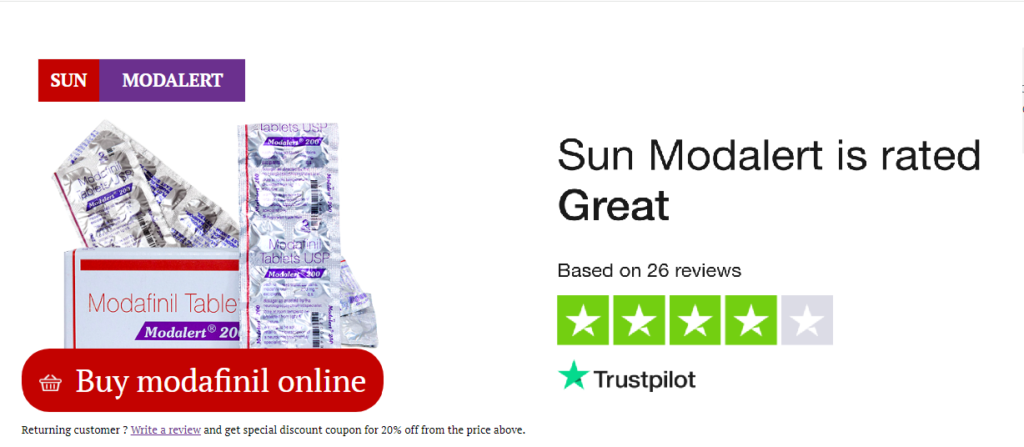Modalerts vs Caffeine short comparison: Modalert provides long-lasting, steady focus and alertness, while caffeine offers a quick, short-term energy boost but can lead to jitters and a crash.
Overview of Modalert and Caffeine
Modalert is a prescription drug primarily used to treat sleep disorders like narcolepsy, shift work sleep disorder, and sleep apnea. However, it is also widely used off-label as a cognitive enhancer due to its ability to improve focus, attention, and wakefulness without the overstimulation associated with many traditional stimulants.
Caffeine is the most widely used psychoactive substance globally, found in coffee, tea, energy drinks, and various other products. As a natural stimulant, caffeine is often used to improve energy, mood, and mental alertness. Unlike Modalert, caffeine is easily accessible without a prescription and is generally safe in moderate amounts.
Mechanism of Action
Understanding how Modalert and caffeine work in the brain can clarify why their effects differ significantly.
How Modalert Works
Modalert works by influencing various neurotransmitters, such as dopamine, norepinephrine, serotonin, and histamine, although it does so indirectly. This selective action promotes wakefulness, alertness, and cognitive function without the intense stimulation of typical stimulants. Modalert’s unique mechanism helps users stay awake and focused without causing a “crash” or jittery side effects, as seen with some stimulants. Its effects are steady, lasting for 10 to 12 hours, making it ideal for long work or study sessions.
How Caffeine Works
Caffeine primarily works by blocking adenosine receptors in the brain. Adenosine is a neurotransmitter responsible for promoting relaxation and sleepiness, so by blocking it, caffeine helps users feel more awake and alert. Caffeine also stimulates the release of dopamine and adrenaline, providing a quick energy boost. However, caffeine’s effects are shorter-lived, typically lasting 3 to 5 hours, and users often experience a “crash” as the effects wear off, leading to a dip in energy and alertness.
Comparison of Benefits
Wakefulness and Alertness
Both Modalert and caffeine are highly effective at promoting wakefulness, though they achieve it in different ways.
- Modalert: Users report a calm, sustained sense of wakefulness without the rush or crash associated with caffeine. Modalert is popular among those who need prolonged alertness, such as night-shift workers or students preparing for exams. Its effects are stable and last most of the day, making it ideal for tasks requiring consistent focus.
- Caffeine: Caffeine provides a quick and intense burst of alertness, which is why many reach for a cup of coffee or an energy drink in the morning or during an afternoon slump. The wakefulness is usually more pronounced at first but may fade quickly, especially if the person is a regular caffeine user with some tolerance.
Focus and Concentration between Modalert vs caffeine
Both substances enhance focus, though the quality of focus experienced with each can differ.
- Modalert: Known for its cognitive-enhancing effects, Modalert users often describe a clear, steady focus that feels natural rather than forced. Many people find it easier to enter a “flow state” on Modalert, where they can concentrate deeply on tasks for extended periods without feeling distracted. This quality makes it particularly popular in high-demand professions or academic settings.
- Caffeine: Caffeine enhances concentration to a degree, but it can sometimes lead to restlessness or jitteriness, especially in higher doses. Users who are sensitive to caffeine or who consume large amounts may experience reduced focus due to feelings of overstimulation. However, moderate doses can enhance alertness and concentration for short tasks or activities.
Mental and Physical Energy
While both Modalert and caffeine boost energy, the experience varies based on the individual and dosage.
- Modalert: Users report feeling physically and mentally energized without the jitteriness that caffeine sometimes causes. Because it does not directly stimulate the central nervous system in the same way as caffeine, Modalert provides smoother, more sustained energy. It’s ideal for those needing consistent energy for long periods, such as a full workday or intense study sessions.
- Caffeine: Caffeine offers a fast-acting physical and mental energy boost, making it popular as a pre-workout supplement or a morning pick-me-up. However, caffeine’s quick metabolism means that its effects tend to taper off within a few hours, often resulting in an energy dip or “crash.” Regular caffeine users may also develop tolerance, reducing its energy-boosting effects over time.
Drawbacks and Side Effects of Modalert vs caffeine
While both Modalert and caffeine are considered safe in moderation, each comes with its own potential side effects.
Modalert Side Effects
- Insomnia: Due to its long duration, taking Modalert too late in the day can interfere with sleep.
- Headaches: Some users experience headaches, often linked to dehydration or individual sensitivity.
- Reduced Appetite: Modalert can sometimes suppress appetite, which some users may find beneficial, though others may find it disruptive.
- Prescription Requirement: Unlike caffeine, Modalert is not available over-the-counter, requiring a prescription in most places due to its potent effects.
Caffeine Side Effects
- Jitters and Anxiety: High doses of caffeine can lead to feelings of restlessness, anxiety, and even tremors, especially in those sensitive to stimulants.
- Energy Crash: After the effects wear off, caffeine users may experience a crash, characterized by low energy and sometimes irritability.
- Insomnia: Caffeine has a half-life of around 5 hours, so consuming it later in the day can interfere with sleep.
- Tolerance and Dependency: Regular caffeine users often develop a tolerance, requiring higher amounts to achieve the same effects. Dependency can also lead to withdrawal symptoms like headaches and fatigue if caffeine intake is suddenly reduced.
Long-Term Effects and Safety
When comparing Modalert and caffeine, it’s important to consider their long-term impact on health and safety.
Modalert
Modalert is generally considered safe for long-term use when prescribed and taken under medical supervision. Since it has a low risk of dependency, users can often use Modalert regularly without building a tolerance or facing withdrawal symptoms. However, because it influences brain chemicals associated with alertness and focus, prolonged use should still be monitored by a healthcare provider.
Caffeine
Moderate caffeine intake is widely recognized as safe and may even have health benefits, such as improving mood and cognitive function. However, excessive consumption can lead to tolerance, dependency, and even health issues like high blood pressure or digestive problems. Regular use of high doses can also exacerbate anxiety and sleep problems. Unlike Modalert, caffeine withdrawal can cause noticeable symptoms, such as headaches, fatigue, and mood swings.
Choosing Between Modalert and Caffeine
The choice between Modalert vs caffeine depends on an individual’s specific needs, lifestyle, and tolerance.
- Choose Modalert if you require prolonged wakefulness, steady energy, and enhanced focus for demanding tasks. It’s particularly suitable for those with sleep disorders or individuals in high-stakes professions. However, as a prescription medication, it should be used under medical supervision.
- Choose Caffeine if you need a quick, accessible boost in energy and alertness. Caffeine is ideal for short-term tasks and is widely available, making it easy to incorporate into daily routines. Moderation is key to avoid dependence and tolerance, allowing caffeine to remain effective when needed.
Final Thoughts about Modalert vs Caffeine
Modalert and caffeine are two different stimulants, each with unique benefits and potential side effects. Modalert provides a calm, sustained focus ideal for long-term productivity, while caffeine offers an immediate energy boost more suited to short-term alertness. Users should consider their own needs, tolerance levels, and the demands of their daily activities when choosing between these two options.
Ultimately, while both Modalert and caffeine can help improve alertness, they work best in different contexts. With proper use, each can enhance productivity, focus, and overall mental performance.

